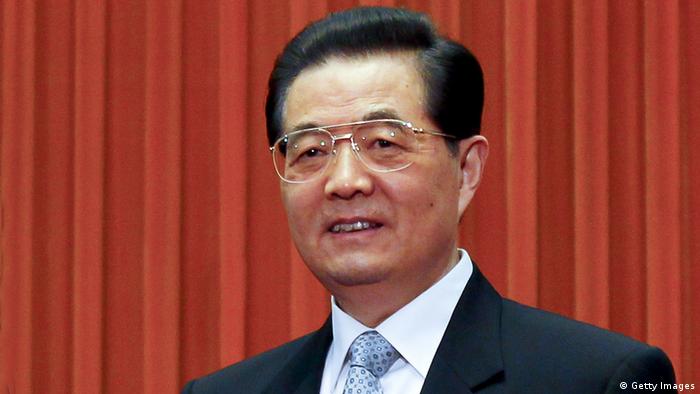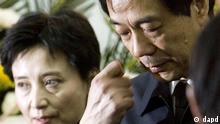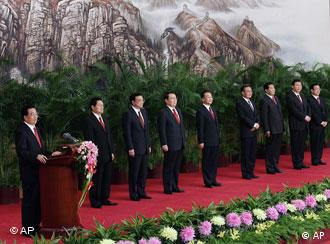
China's outgoing president thinks big while appearing to make concessions to Bo Xilai's supporters.
In the final phase of his 10-year tenure as general secretary of the
Chinese Communist Party (CCP), President Hu Jintao has finally shaken
off his well-known timidity and staged maneuvers to secure the
preeminence of the Communist Youth League (CYL) Faction and his own
legacy.
On the surface, Hu seems to have succumbed to the forces of conservatism by making a key decision to put a "limit" on the investigations into the Bo Xilai case. This means that only two people - Bo and his lawyer wife Gu Kailai - will be investigated.
Gu Kailai has already been charged with murdering British businessmen Neil Heywood and will probably be sentenced to a relatively lengthy jail term, however "Princeling Bo" has only been accused of "infringing party discipline."
 Bo Xilai and his wife Gu Kailai have accumulated millions
Bo Xilai and his wife Gu Kailai have accumulated millions
No criminal charges such as corruption have been brought against him,
despite the much publicized fact that the Bo-Gu family has accumulated a
wealth of over $2 billion and that many of the funds have been
laundered overseas.
Let off lightly
Bo could be let off lightly after confessing to violating party discipline. Indeed, the latest internal CCP circular said that the scandal should be regarded by cadres as an "isolated incident," that is, not a conspiracy involving a sizeable ring of anti-party elements.
More significantly, none of Bo's senior accomplices will face criminal or party-discipline proceedings. These include Politburo Standing Committee (PBSC) member Zhou Yongkang, who is in charge of the police-state apparatus.
Two Bo cronies in the PLA who are "princeling generals" are also implicated - the political commissar (PC) of the General Logistics Department General Liu Yuan and the PC of the Second Artillery Corps (missile forces) General Zhang Haiyang.
 British businessman Neil Heywood was killed in November 2011
British businessman Neil Heywood was killed in November 2011
The fact that Bo has close ties to the military made his "rebellion"
much more serious than that of the former Shanghai party secretary Chen
Liangyu, who had been sacked by Hu in 2006 for refusing to obey
instructions from the central party authorities.
Supported by combined forces
Three main forces are behind the decision to restrict the scope of investigations against the Bo gang. The first consists of crypto-Maoist cadres who still hold senior positions in the party, government and army; they have praised Bo for re-hoisting the banner of Maoism. The second pillar of Bo's support comes from former President Jiang Zemin, who was a good friend of Bo's late father, the revered party elder Bo Yibo. Thirdly, "crown prince" Vice-President Xi Jinping does not want to go after Bo's supporters. After all, even though Bo maneuvered to sideline Xi, they share many common cronies.
In return for "sparing" the high-profile members of Bo's "conspiracy ring," however, Hu has extracted a promise from ex-president Jiang and president-in-waiting Xi that he can remain Chairman of the Central Military Commission (CMC) for at least two years after the 18th CCP Congress.
Pushed to the forefront
While the world's focus has been on the nine future members of the PBSC to be confirmed at the 18th Congress, it is important to note that Hu is set to induct several CYL Faction affiliates to the Politburo as ordinary members. These include the party secretaries of Inner Mongolia and Hunan Province, Hu Chunhua (born 1963) and Zhou Qiang (1960), as well as the First Party Secretary of the Communist Youth League, Lu Hao. Hu Chunhua (who is not related to President Hu) is a candidate to become Party Secretary of either the Beijing municipality or Guangdong Province; while Zhou could become party boss of Chongqing after the 18th Congress.
This time around, Hu has been forced to surrender his posts of general secretary and president to Vice-President Xi - and not to long-time CYL protégé Li Keqiang - but the wily supremo is certain that the CYL faction will become even more prominent from the 19th Congress onwards.
 The next Politburo Standing Committee will be elected in November
The next Politburo Standing Committee will be elected in November
The biggest casualty of these Machiavellian machinations is political
liberalization, which will continue to be put on the back burner. In
internal meetings, Premier Wen Jiabao, the only liberal among the
current PBSC members, has been criticized for comparing Bo's
"singing-red-songs" campaign in Chongqing to the Cultural Revolution.
Given that the Maoist forces behind Bo have not been disciplined, let
alone eradicated, it is possible that - particularly after Wen's
retirement at the 18th Congress - another potent Maoist political
campaign could be launched in 2013.
It must be remembered that both Hu and future leader Xi are to some extent Mao disciples. While he is a keen political opponent of Bo's, Hu has used quintessentially Maoist means to hit out at dissidents and political foes - and to ensure the advancement of his own clique.
Author: Willy Lam
Editor: Grahame Lucas
On the surface, Hu seems to have succumbed to the forces of conservatism by making a key decision to put a "limit" on the investigations into the Bo Xilai case. This means that only two people - Bo and his lawyer wife Gu Kailai - will be investigated.
Gu Kailai has already been charged with murdering British businessmen Neil Heywood and will probably be sentenced to a relatively lengthy jail term, however "Princeling Bo" has only been accused of "infringing party discipline."
 Bo Xilai and his wife Gu Kailai have accumulated millions
Bo Xilai and his wife Gu Kailai have accumulated millionsLet off lightly
Bo could be let off lightly after confessing to violating party discipline. Indeed, the latest internal CCP circular said that the scandal should be regarded by cadres as an "isolated incident," that is, not a conspiracy involving a sizeable ring of anti-party elements.
More significantly, none of Bo's senior accomplices will face criminal or party-discipline proceedings. These include Politburo Standing Committee (PBSC) member Zhou Yongkang, who is in charge of the police-state apparatus.
Two Bo cronies in the PLA who are "princeling generals" are also implicated - the political commissar (PC) of the General Logistics Department General Liu Yuan and the PC of the Second Artillery Corps (missile forces) General Zhang Haiyang.
 British businessman Neil Heywood was killed in November 2011
British businessman Neil Heywood was killed in November 2011Supported by combined forces
Three main forces are behind the decision to restrict the scope of investigations against the Bo gang. The first consists of crypto-Maoist cadres who still hold senior positions in the party, government and army; they have praised Bo for re-hoisting the banner of Maoism. The second pillar of Bo's support comes from former President Jiang Zemin, who was a good friend of Bo's late father, the revered party elder Bo Yibo. Thirdly, "crown prince" Vice-President Xi Jinping does not want to go after Bo's supporters. After all, even though Bo maneuvered to sideline Xi, they share many common cronies.
In return for "sparing" the high-profile members of Bo's "conspiracy ring," however, Hu has extracted a promise from ex-president Jiang and president-in-waiting Xi that he can remain Chairman of the Central Military Commission (CMC) for at least two years after the 18th CCP Congress.
Pushed to the forefront
While the world's focus has been on the nine future members of the PBSC to be confirmed at the 18th Congress, it is important to note that Hu is set to induct several CYL Faction affiliates to the Politburo as ordinary members. These include the party secretaries of Inner Mongolia and Hunan Province, Hu Chunhua (born 1963) and Zhou Qiang (1960), as well as the First Party Secretary of the Communist Youth League, Lu Hao. Hu Chunhua (who is not related to President Hu) is a candidate to become Party Secretary of either the Beijing municipality or Guangdong Province; while Zhou could become party boss of Chongqing after the 18th Congress.
This time around, Hu has been forced to surrender his posts of general secretary and president to Vice-President Xi - and not to long-time CYL protégé Li Keqiang - but the wily supremo is certain that the CYL faction will become even more prominent from the 19th Congress onwards.
 The next Politburo Standing Committee will be elected in November
The next Politburo Standing Committee will be elected in NovemberIt must be remembered that both Hu and future leader Xi are to some extent Mao disciples. While he is a keen political opponent of Bo's, Hu has used quintessentially Maoist means to hit out at dissidents and political foes - and to ensure the advancement of his own clique.
Author: Willy Lam
Editor: Grahame Lucas
Moving the family abroad
Hedging their bets
Officials, looking for an exit strategy, send family and cash overseas
May 26th 2012 | BEIJING
| from the print edition
THE phrase “naked official”, or luo guan,
was coined in 2008 by a bureaucrat and blogger in Anhui province, Zhou
Peng’an, to describe officials who have moved their family abroad, often
taking assets with them. Once there, they are beyond the clutches of
the Communist Party in case anything, such as a corruption
investigation, should befall the official, who is left back at home
alone (hence “naked”). Mr Zhou says the issue has created a crisis of
trust within the party, as officials lecture subordinates on patriotism
and incorruptibility, but send their own families abroad.
You do not have to be corrupt to be “naked”, however. Sending your family abroad is simply a state of maximum readiness. It does not suggest huge confidence in a stable Chinese future. Many wealthy businessmen have also been preparing exit strategies. One of the most common legitimate routes involves immigrant-investor programmes in America, Canada or Hong Kong, typically requiring an investment of up to $1m. Chinese nationals have rushed to apply for these. Three-quarters of applicants for America’s programme last year were Chinese.
The less well-heeled obtain passports from other countries—in the South Pacific, Africa or Latin America—at more affordable prices (as low as $20,000). Li Chengyan, director of the Centre for Anti-Corruption Studies at Peking University, says countries that do not have an extradition treaty with China are particularly popular among corrupt officials. One crooked former governor of Yunnan province was found to have five foreign passports. “No need to wait for a visa if they have to run,” says Mr Li.
For senior officials the usual first step to getting naked is to send children overseas to study. Perhaps the most famous example is the recently purged party chief of Chongqing, Bo Xilai. Mr Bo’s son, Bo Guagua, is a graduate student at Harvard University, after attending Harrow School and Oxford University in Britain. Mr Bo’s wife, Gu Kailai (now detained on suspicion of murdering a British businessman in Chongqing), has lived abroad, and their broader family is worth more than $100m, according to the New York Times.
The government has done little to stop the emigration. It began formally to monitor the whereabouts of officials’ families and assets only last year, and then only by asking officials to fill in forms. In 2011 the central bank published an estimate on its website, attributed to the Chinese Academy of Social Sciences, that up to 18,000 officials had fled the country between 1995 and 2008 with stolen assets totalling 800 billion yuan ($130 billion at today’s exchange rate). The bank then claimed the figures were inaccurate, and scrubbed them from its website (though not from the memories of those who had read them). The chief prosecutor, Cao Jianming, says that in 2011 foreign governments helped arrest 1,631 Chinese fugitives for “work-related crimes” (including officials and employees of state-owned firms) and to recover 7.8 billion yuan in stolen assets.
Some senior officials have pushed for reform. In January Guangdong province in southern China announced that officials whose families have emigrated will be barred from high-level posts. But this is an exception. Officials who can afford to send their families abroad are usually the most powerful, and the most aware of China’s problems. Says Mr Li of Peking University, “They know better than anyone that the China model is not sustainable and that it’s a risk to everybody.”
You do not have to be corrupt to be “naked”, however. Sending your family abroad is simply a state of maximum readiness. It does not suggest huge confidence in a stable Chinese future. Many wealthy businessmen have also been preparing exit strategies. One of the most common legitimate routes involves immigrant-investor programmes in America, Canada or Hong Kong, typically requiring an investment of up to $1m. Chinese nationals have rushed to apply for these. Three-quarters of applicants for America’s programme last year were Chinese.
The less well-heeled obtain passports from other countries—in the South Pacific, Africa or Latin America—at more affordable prices (as low as $20,000). Li Chengyan, director of the Centre for Anti-Corruption Studies at Peking University, says countries that do not have an extradition treaty with China are particularly popular among corrupt officials. One crooked former governor of Yunnan province was found to have five foreign passports. “No need to wait for a visa if they have to run,” says Mr Li.
For senior officials the usual first step to getting naked is to send children overseas to study. Perhaps the most famous example is the recently purged party chief of Chongqing, Bo Xilai. Mr Bo’s son, Bo Guagua, is a graduate student at Harvard University, after attending Harrow School and Oxford University in Britain. Mr Bo’s wife, Gu Kailai (now detained on suspicion of murdering a British businessman in Chongqing), has lived abroad, and their broader family is worth more than $100m, according to the New York Times.
The government has done little to stop the emigration. It began formally to monitor the whereabouts of officials’ families and assets only last year, and then only by asking officials to fill in forms. In 2011 the central bank published an estimate on its website, attributed to the Chinese Academy of Social Sciences, that up to 18,000 officials had fled the country between 1995 and 2008 with stolen assets totalling 800 billion yuan ($130 billion at today’s exchange rate). The bank then claimed the figures were inaccurate, and scrubbed them from its website (though not from the memories of those who had read them). The chief prosecutor, Cao Jianming, says that in 2011 foreign governments helped arrest 1,631 Chinese fugitives for “work-related crimes” (including officials and employees of state-owned firms) and to recover 7.8 billion yuan in stolen assets.
Some senior officials have pushed for reform. In January Guangdong province in southern China announced that officials whose families have emigrated will be barred from high-level posts. But this is an exception. Officials who can afford to send their families abroad are usually the most powerful, and the most aware of China’s problems. Says Mr Li of Peking University, “They know better than anyone that the China model is not sustainable and that it’s a risk to everybody.”
沒有留言:
張貼留言